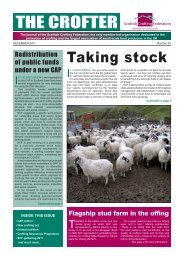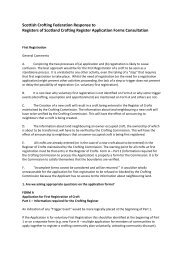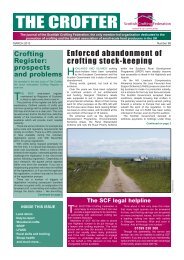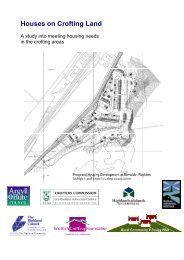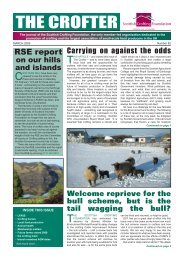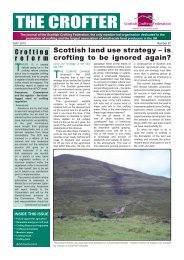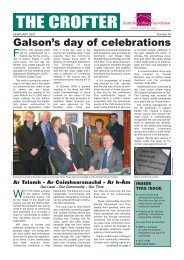Crofter 97 - Scottish Crofting Federation
Crofter 97 - Scottish Crofting Federation
Crofter 97 - Scottish Crofting Federation
You also want an ePaper? Increase the reach of your titles
YUMPU automatically turns print PDFs into web optimized ePapers that Google loves.
2<br />
Message from the chair...<br />
T<br />
HIS HAS BEEN a season<br />
for adjustment.<br />
After five years as<br />
chief executive of the <strong>Crofter</strong>s<br />
Commission, the retiral of Nick Reiter<br />
feels like the loss of a friend. Certainly<br />
he has been a friend to crofting<br />
during a period when crofting has<br />
been preparing for change.<br />
Following the creation of the<br />
new <strong>Crofting</strong> Commission in April<br />
and the delay in finding the correct<br />
procedure, we are pleased that<br />
United<br />
front<br />
needed<br />
on EID<br />
T<br />
HE SCF HAS RENEWED its call<br />
to sort out the impracticability and<br />
injustice of individual electronic<br />
identifi cation of sheep (EID).<br />
Returning from Brussels where he took<br />
part in a series of meetings discussing EID,<br />
SCF parliamentary spokesman Norman<br />
Leask said “EID was a hot topic at the<br />
sheep and goat meat advisory group I was<br />
attending. It was the main topic again at the<br />
German shepherds’ meeting, who are taking<br />
the European Commission to the court of<br />
human rights in Strasbourg, over EID. This is<br />
not something that will just go away”.<br />
“I was also part of the delegation<br />
meeting with DG Agri, organised by Alyn<br />
Smith MEP, presenting fi ndings of a<br />
survey of Shetland sheep producers. The<br />
Commission require evidence before they<br />
will revisit the EID legislation so thank you<br />
to all Shetland crofters who participated.”<br />
The two main areas that SCF is pressing<br />
for change to the legislation are:<br />
1. that animals six months after entering<br />
a fl ock are considered part of that fl ock and<br />
no longer require special recording; and<br />
2. that animals only require EID when they<br />
leave the jurisdiction of the keeper at birth.<br />
Norman continued: “Both these positions<br />
are accepted as not harming traceability<br />
so they would be possible if we can gather<br />
the evidence to persuade the European<br />
Commission to re-visit this ill-conceived<br />
legislation. A united front and lots of<br />
evidence is required and only the crofters<br />
and the sheep farmers who are being<br />
severely penalised can supply this”.<br />
Susan Walker has been appointed<br />
convenor from amongst the new<br />
commissioners. Susan is known<br />
to us as an active crofter; but<br />
more than that, she is an activist,<br />
previously lauded for being the coauthor<br />
(with Iain MacKinnon) of The<br />
State of <strong>Crofting</strong> in Camuscross in<br />
August 2009. This remarkable and<br />
timely piece of work focused on<br />
the problems of her own crofting<br />
township and informed the <strong>Scottish</strong><br />
Parliament during the later stages<br />
of the law reform process. Indeed<br />
one suspects that it could have<br />
been the reason for the duty to<br />
report now on the statute book.<br />
SCF members should be sure to<br />
read the Camuscross report to<br />
understand where Susan is coming<br />
from, in more ways than one.<br />
In the face of reports of active<br />
crofting being in decline, parts of<br />
the Sleat peninsula in the south of<br />
Skye seem to be bucking the trend.<br />
Susan has been part of that and, as<br />
a director of the Camuscross and<br />
Duisdale initiative, she understands<br />
well the need for action. So, with its<br />
enhanced powers and duties and<br />
with its new leader, we are already<br />
seeing the Commission tackle<br />
absenteeism and dealing with the<br />
neglect and misuse of crofts.<br />
It was heartening to find at the<br />
September <strong>Crofting</strong> Law Group<br />
conference in Portree that SCF’s<br />
activity towards community<br />
mapping was held in such high<br />
regard. It is a pity that our efforts<br />
are not being properly funded. We<br />
learnt that the national <strong>Crofting</strong><br />
Register will open on time on 30<br />
November and how it will collect<br />
map-based information on every<br />
croft and every common grazing.<br />
But we at SCF have been hoping<br />
for more. When crofters set out<br />
to map their land it can be the<br />
starting point for community<br />
asset-planning, working towards a<br />
brighter future. We are encouraging<br />
has been the case since area payments were<br />
introduced, but for SPS it matters little, since<br />
the payment rate is individually calculated on<br />
a historic basis. But with a uniform payment<br />
rate it really makes a difference.<br />
On average about a third of all the forage<br />
on grazings which are used in part to support<br />
SPS claims is not declared. That means that<br />
the claiming producers, though managing the<br />
whole grazings, would get a third less than they<br />
would otherwise receive. That’s the average,<br />
but there are many cases which are much<br />
worse. I found one where 95% of the grazings<br />
is unclaimed by the sole active grazier.<br />
What is the solution? What indeed! It<br />
is an extremely intractable problem and I am<br />
struggling with it myself.<br />
The fi rst challenge is to get people to think<br />
it is a problem and one worth tackling. That<br />
means civil servants of course. I heard one<br />
say words to the effect, “Why would I pay a<br />
crofter more for something he is willing to do<br />
for half as much?” But also politicians and,<br />
sadly, crofters themselves.<br />
What possible answers suggest<br />
themselves? To me the obvious ones are:<br />
• make the grazings committee eligible for<br />
the national reserve;<br />
• for each committee to submit an application<br />
on the basis of all the unused shares in the<br />
fi rst year;<br />
• for the regulations to be amended if<br />
necessary to ensure that any shareholders<br />
subsequently submitting a new claim receive<br />
the appropriate number of entitlements from<br />
the committee.<br />
The main objection to this seemingly simple<br />
solution (though one which needs all grazings<br />
to be regulated and have committees in offi ce)<br />
is based on the active farmer rules in the new<br />
draft EU regulations, including, ironically, the<br />
THE CROFTER, DECEMBER 2012<br />
Derek Flyn<br />
crofting communities to recognise<br />
the multiple benefits that can be<br />
had from sitting down together.<br />
I am pleased that our own future<br />
is now more secure. There are now<br />
four new members on the SCF<br />
board, namely Roddy MacDonald<br />
from South Uist, Iain Keith from<br />
Caithness, David Smith from<br />
Shetland and Finlay Matheson<br />
from Strathcarron. They bring<br />
with them an enormous amount of<br />
knowledge and experience and I<br />
look forward to working with them.<br />
Fiona Mandeville (vice-chair),<br />
Paddy Zakaria and Norman Leask<br />
make up the remainder of what I<br />
believe to be a strong team.<br />
The real strength of our<br />
organisation is in its members.<br />
The board is keen to encourage<br />
area and branch activities and<br />
will respond positively to any<br />
invitation to travel to meet and to<br />
hear how we can help those who<br />
have joined our cause.<br />
Equity in area payments<br />
for common graziers?<br />
Continued from page 1<br />
so-called <strong>Scottish</strong> clause inserted to prevent<br />
large unfarmed estates from putting in claims.<br />
It would not seem to be beyond the wit<br />
of man for the regulations to be amended,<br />
either with a specifi c derogation for common<br />
grazings or with a more general ‘at the<br />
discretion of member states’ wording. But<br />
that requires political will, and I see little<br />
sign of it and not many shouting for it either.<br />
Which baffl es me, frankly.<br />
What alternatives might there be? Civil<br />
servants in the department seem to think<br />
one is keeping the national reserve open<br />
each year, not just in 2014. But while this<br />
would mean that new claims from previously<br />
inactive shareholders are possible, it does<br />
nothing to address the bigger problem for the<br />
existing claimants in the interim.<br />
What else might be possible? Agrienvironment<br />
is out, because the lost payment<br />
is for the cost of meeting the minimum activity,<br />
not for going beyond it.<br />
Perhaps the next best solution might be<br />
the new ANC payments (replacing LFASS).<br />
They have the benefi t of being claimed every<br />
year, so the amount claimed can vary as long<br />
as something is claimed for the fi rst fi ve years<br />
after the initial claim.<br />
It would be possible, perhaps, to have a<br />
special ANC rate, equal to the sum of basic<br />
payment and normal ANC rates for that parish,<br />
and specifi c interpretations of the activity rules<br />
for common grazings committee applicants.<br />
These are just my ideas. It is essential that<br />
the real experts get their heads round the<br />
issue. So far they have at best been coming<br />
up with additional problems – now it’s time for<br />
some solutions.<br />
Gwyn Jones, EFNCP<br />
gwyn@efncp.org<br />
THE CROFTER, DECEMBER 2012 3<br />
Steady as she goes<br />
Parting words from <strong>Crofting</strong><br />
Commission chief executive<br />
Nick Reiter<br />
W<br />
HEN I WAS appointed<br />
to the <strong>Crofter</strong>s<br />
Commission in 2007, I<br />
was told that it had gone through<br />
a lot of changes and now needed<br />
a period of “steady as she goes”<br />
consolidation. It did not take long<br />
for me to realise that the changes<br />
had only just begun.<br />
As I take retirement some<br />
five years later, we have two<br />
new <strong>Crofting</strong> Acts in operation;<br />
a new, mostly elected <strong>Crofting</strong><br />
Commission; a new statutory plan,<br />
hopefully approved by the new<br />
minister by the time you read this;<br />
even a new HQ location. I would<br />
say to my successor, whomever<br />
that will be, that what is needed<br />
now is a period of “steady as<br />
she goes” consolidation – but<br />
I know that would be a gross<br />
misrepresentation.<br />
However, there have been<br />
some constants. The very real<br />
commitment to the wellbeing<br />
of crofting among the staff and<br />
commissioners here has been<br />
unwavering and it’s fair to say that<br />
at times we have all felt frustrated<br />
that we cannot do more. But the<br />
Commission was and remains first<br />
and foremost a regulator.<br />
That’s why a strong, effective<br />
representative and lobbying<br />
organisation is so essential. It may<br />
seem odd for a government agency<br />
to stress that. Of course there<br />
have been differences of views<br />
between the Commission and the<br />
SCF – which incidentally changed<br />
its name during my five years – not<br />
even that was a constant. But far<br />
more often we have agreed on the<br />
needs of crofting in the 21st century;<br />
and there is I believe an improved<br />
understanding of our different roles.<br />
On a personal level I have always<br />
found all the representatives of<br />
the SCF courteous, helpful and<br />
enthusiastic and I’d like to express<br />
my gratitude for that.<br />
It’s tempting for a departing<br />
chief executive to leave some<br />
parting words of deep wisdom and<br />
insight. I have none to offer. But<br />
one thing is clear to me: crofting<br />
continues to punch above its<br />
weight politically and socially. That<br />
is evidence that it is valued not just<br />
by the people actively involved in<br />
it, but by Scotland as a whole. The<br />
<strong>Crofting</strong> Commission, the SCF,<br />
other representative bodies and the<br />
media all have their part to play. But<br />
that enviable position has been hard<br />
won mostly by crofters themselves<br />
and I firmly believe it is mostly in<br />
their hands that it remains.<br />
Land Reform Review Group<br />
T<br />
HE Land Reform Review<br />
Group is an independent<br />
group set up by the<br />
<strong>Scottish</strong> Government to develop<br />
innovative and radical proposals<br />
that will contribute to Scotland’s<br />
future success.<br />
The relationship between the<br />
land and the people of Scotland<br />
is fundamental. The structure of<br />
land ownership is a defi ning factor<br />
in that relationship: it can facilitate<br />
and promote development, but it<br />
can also hinder it.<br />
In recent years, various<br />
approaches to land reform, not<br />
least community ownership, have<br />
contributed positively to a more<br />
successful Scotland by assisting<br />
in the reduction of barriers to<br />
sustainable development, by<br />
strengthening communities and<br />
by giving them a greater stake in<br />
their future.<br />
The Land Reform Review<br />
Group has been appointed by<br />
<strong>Scottish</strong> ministers to identify how<br />
land reform will:<br />
• enable more people in<br />
rural and urban Scotland to<br />
have a stake in the ownership,<br />
governance, management and<br />
use of land;<br />
• assist with the acquisition and<br />
management of land (and also<br />
land assets) by communities, to<br />
make stronger, more resilient and<br />
independent communities which<br />
have an even greater stake in<br />
their development;<br />
• generate, support, promote,<br />
and deliver new relationships<br />
between land, people, economy<br />
and environment in Scotland.<br />
The review group is chaired by<br />
Dr Alison Elliot. Its vice-chairs are<br />
Dr Sarah Skerratt and Professor<br />
James Hunter.<br />
Give Feedback<br />
To allow the Land Reform<br />
Review Group to explore and<br />
analyse evidence and to enable<br />
the group to identify key themes<br />
for further exploration, responses<br />
are invited by 11 January 2013.<br />
Electronic responses should be<br />
emailed to landreformreview@<br />
scotland.gsi.gov.uk and hard<br />
copies should be sent to:<br />
Dave Thomson<br />
Land Reform Review, E1 Spur<br />
Saughton House, Broomhouse<br />
Drive, Edinburgh EH11 3XD<br />
Looking to the future<br />
with the <strong>Crofting</strong><br />
Commission convener<br />
I<br />
T SEEMED LIKE a long wait<br />
but at the end of September<br />
minister for the environment<br />
and climate change, Paul<br />
Wheelhouse, announced the<br />
appointment of the fi rst convener<br />
of The <strong>Crofting</strong> Commission.<br />
Based on Skye, Susan Walker<br />
has been an active crofter for<br />
thirty years and is honoured<br />
to be leading the organisation<br />
at a time of accelerating<br />
change. Susan commented:<br />
“We have a formidable team of<br />
commissioners and we have a<br />
real opportunity to help shape<br />
the future of the Commission<br />
and crofting. We work as a team<br />
because by doing so we bring a<br />
wealth of talents, knowledge and<br />
understanding of the different<br />
crofting counties.<br />
“I am delighted that on 2nd<br />
November commissioners voted<br />
to appoint a vice-convener, with<br />
Colin Kennedy of Coll winning the<br />
vote. Colin has an unusually deep<br />
understanding of both practical and<br />
legal crofting issues which is very<br />
valuable. At the same meeting, we<br />
also appointed Murdo MacLennan<br />
from the Western Isles as our<br />
Gaelic spokesman, an important<br />
role, with almost 50% of all crofts<br />
in the Gaelic-speaking areas of the<br />
Western Isles.<br />
“<strong>Crofting</strong> is unique, something<br />
we all cherish and, while respecting<br />
the past, our focus is on using the<br />
regulatory system to help build a<br />
sustainable future for crofting, in<br />
which the benefits can be seen far<br />
beyond the crofting counties.<br />
“The first nine months in the life<br />
of the new Commission have been<br />
a whirlwind of activity, centred on<br />
regulatory decision-making, building<br />
contacts with other organisations<br />
and the preparation of a plan, which<br />
will guide us through the coming<br />
years and expresses our aspirations<br />
and ambitions for crofting. The plan<br />
sets out how we will make decisions<br />
in line with the legislation and<br />
explains the benefits when crofting<br />
is consistently and fairly regulated in<br />
line with government policies.<br />
“One of the provisions in the<br />
<strong>Crofting</strong> Reform (Scotland) Act,<br />
passed in 2010, which we know<br />
is causing concern, is the new<br />
statutory duty placed on the<br />
<strong>Crofting</strong> Commission to seek<br />
certain information from individual<br />
crofters every year and from<br />
grazing committees every five<br />
years. We are aware that this is<br />
generating disquiet among grazing<br />
committees and clerks.<br />
“I would like to reassure everyone<br />
that we will be consulting you to<br />
devise a method for reporting.<br />
To this end, we are working with<br />
others, such as grazing committees,<br />
assessors and the SCF to devise a<br />
reporting form.<br />
“Through this consultation<br />
process we can devise a<br />
form which everyone will feel<br />
comfortable with but which will<br />
also allow crofting communities<br />
to report problems to us where<br />
they choose to do so. This will<br />
encourage grazing committees<br />
and individuals to move towards<br />
greater self-regulation, by<br />
allowing them to make their<br />
own assessments of the state of<br />
their croft or of crofting in their<br />
townships and think carefully<br />
about the impact this has on their<br />
community.<br />
“With this approach, there is<br />
an opportunity for us to work<br />
together to gather the information<br />
we need to enable us to raise the<br />
profile of crofting with ministers<br />
and the <strong>Scottish</strong> Parliament and<br />
to present a clear picture of the<br />
state of crofting: its value and<br />
contribution to life in Scotland and<br />
the threats and problems it faces.”<br />
go online at<br />
www.crofting.org




